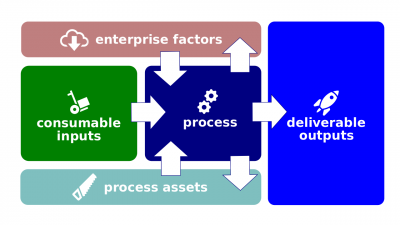Difference between revisions of "Process"
(→Related coursework) |
|||
| Line 7: | Line 7: | ||
:[[Process]]. An action that individuals, groups, and organizations engage in as a result of [[input]]s and that leads to certain [[outcome]]s. | :[[Process]]. An action that individuals, groups, and organizations engage in as a result of [[input]]s and that leads to certain [[outcome]]s. | ||
| − | ==Related | + | ==Related lectures== |
*[[Effort Engineering Quarter]]. | *[[Effort Engineering Quarter]]. | ||
[[Category: Septem Artes Administrativi]][[Category: Articles]] | [[Category: Septem Artes Administrativi]][[Category: Articles]] | ||
Revision as of 12:56, 4 January 2019
Process (hereinafter, the Process) is a sequenced series, predefined, empiric, and/or merely chaotic, of activities undertaken in order to achieve particular results. In other words, a process is a repetitive or ad-hoc way of work. Effort engineering defines that those activities convert inputs into desired outputs utilizing some process assets such as tools and techniques and while being influenced by some enterprise factors.
Non-repetitive processes are called management processes. Repetitive processes that are performed by people for enterprises are called business processes; those of their sets that produce a deliverable are called operations. Repetitive processes that are performed by systems including computers, robots, and/or machines are called system processes.
Definitions
According to Organizational Behavior by Robbins and Judge (17th edition),
- Process. An action that individuals, groups, and organizations engage in as a result of inputs and that leads to certain outcomes.
